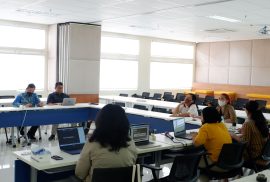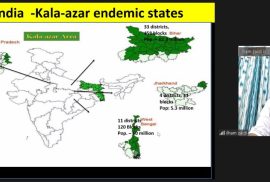Students from three postgraduate’s degree programs in the Faculty of Medicine, Public Health, and Nursing (FK-KMK) at UGM visited PT Bio Farma Bandung on Monday (20/03). This visit was part of the Strategy to Improve Supply and Utilization of Drugs and Vaccine for Tropical Diseases course for Master’s students in Tropical Medicine and Implementation Research. In addition to these two programs, Master’s students in Biomedical Science with a concentration in pharmacology also participated.
Implementation Research students in the even semester of 2022/2023 take two mandatory courses that have been accredited by TropEd. These two courses are “Infection Control: Theory and Practice” and “Strategy to Improve Supply and Utilization of Drugs and Vaccines for Tropical Diseases”.
The current ongoing course is “Infection Control: Theory and Practice”. Students receive various information related to controlling and preventing infections in the community.
To support the theory learned in class, students are taken to visit three different institutions. They are taken on a tour of Sardjito Hospital to see how the hospital serves patiens, the facilities provided, the hospital laboratory, and the waste disposal process.
The academic activities for even semester of 2022-2023 academic year are planned to start in mid-February. In order to prepare for the lectures, the Implemetation Research Program of FK-KMK UGM held an academic meeting on Friday (03/02). Located on the 2nd Floor of the Tahir Foundation Postgraduate Building, North Wing, this meeting invited all coordinators of even semester courses.
The discussion included the assessment from students in previous lectures. This meeting was opened by dr. Elsa H. Murhandarwati, M.Kes., Ph.D as the coordinator of IR Program UGM. The presentation of the evaluation of each courses was delivered by Prof. dr. Ari N. Probandari, MPH., Ph.D as the academic coordinator of the program. Each course presented showed the evaluation results that has been given by students. In the evaluation, students also provide suggestions and input for lecturers.
Social Culture Event for Implementation Research Student Batch 6 in Tuksongo, Magelang, Central Java
Implementation Research Students of Batch 6 engaged in social culture event that was held in Tuksongo Tourism Village (Desa Wisata) in Magelang, Central Java. Various agendas were carried out during the two days of event (18-19/11). Twelve students from various countries participated in this activitiy, including Bangladesh, the Philippines, India, Indonesia, Nepal, Malaysia, and Myanmar.
Students were invited by the community to make batik on the first day (traditional Indonesian cloth). They received instruction and a brief history of the philosophy of batik as well as the necessity of improvising when the wax accidentally ruin the prior design. Then, students are invited to paint the mask made from paper. Selling paper mask is one of the ways from the community surrounding to make a living.
The Postgraduate Program in Tropical Medicine, FK-KMK UGM, again held an online guest lecture on Tuesday (15/11). Dr. Ilham Zaidi, a Program Officer (NTDs) at PATH India, was invited as a guest lecturer. This guest lecture is part of the Epidemiology, Control and Management of NTD courses organized by the Tropical Medicine Postgraduate Program. The course is taken by all International Health – Implementation Research students.
Lecture topics presented by Dr. Ilham Zaidi’s theme is Epidemiology, Control and Management of Leishmaniasis. Leishmaniasis is a parasitic disease caused by the Leishmania protozoa which is transmitted through the bite of a female phlebotomus sandflies.
The Special Program in Implementation Research accepted 12 students for Batch 6 from various countries and has started numerous hybrid classes at FMPHN UGM. To strengthen the bond between students and management, on Monday (17/10) a friendly meeting agenda was held.
Located in the main meeting room (R. Sidang Utama) on the 3rd floor of the KPTU Building, FMPHN UGM, this friendly event was opened by dr. Elsa H. Murhandarwati, M.Kes., Ph.D. She introduced IR UGM including its academic and non-academic activities. Such as in-class learning and visit to partner organizations to broaden insight.
Special Program in Implementation Research, UGM accepted 12 students from various countries as new students for the 2022/2023 academic year. Students come from Indonesia, Bangladesh, India, Nepal, Malaysia, Myanmar, and the Philippines.
Before the lectures begin, students received learning skills lectures. The topics covered Ethics, Professionalism and Portfolio; How to Become Active Learners; Learning Together and Team-based Learning; Professional and Academic Writing; Planning the Future and Time Management; and Social Survival Skills.
For two days (15-16/07), IR-TDR Batch 5 students participated in Social Culture activities at Tembi Tourism Village in Bantul. This activity is part of the cultural introduction and student interaction with the Indonesian community. A total of 18 students from various countries participated in the series of events. The first activity was to make batik. Students create batik motifs using provided patterns. They also observed the coloring process, which resulted in the final product of batik cloth.
Last June (29-30/06), Implementation Research students of FKKMK UGM and several Master Students of Tropical Medicine visited the Institute of Vector and Reservoir Control Research and Development (B2P2VRP) in Salatiga.
Students participated in a variety of activities while accompanied by lecturers dr. E. Esa Herdiana Muhandarwati, M.Kes., Ph.D and Dr. Dra. Retna Siwi Padmawati, MA. On the first day, students were given information on Salatiga’s B2P2VRP profile as well as lectures from B2P2VRP.
Group of Implementation Research students with some peers from Tropical Medicine Master Program visited World Mosquito Program (WMP) Yogyakarta Laboratory on Jalan Podocarpus I, Sekip N-14, Senolowo, Sinduadi, Sleman on Thursday (23/06).
Riris Andono Ahmad, MPH, Ph.D as part of WMP team welcomed and briefly explained the profile of the WMP Yogyakarta, as well as information about mosquitoes with Wolbachia.
Students were divided into two groups. Each group was accompanied by researchers to see firsthand the location of the Wolbachia mosquito production site. They also received information regarding the location of mosquito placement. The researchers also presented data on the decrease of up to 77% of Dengue Hemorrhagic Fever cases at the site of the spread of Wolbachia mosquitoes.










